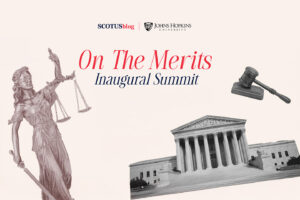
The U.S. Supreme Court shapes how Americans live, work, and participate in civic life. As Congress and the executive branch confront complex challenges, the judiciary plays a defining role in interpreting the law. On Sept. 25, SCOTUSblog and the Stavros Niarchos Foundation Agora Institute will host a summit examining the Supreme Court’s role in American life.
The inaugural SCOTUSblog Summit: On the Merits will convene at the Johns Hopkins University Bloomberg Center in Washington, D.C., bringing together legal scholars, corporate counsels, judges, regulators, and journalists for a day of discussion.
Amy Coney Barrett, Associate Justice of the Supreme Court of the United States, will open the summit with a keynote conversation and signing of her new book, Listening to the Law: Reflections on the Court and Constitution. Her remarks will set the stage for the sessions that follow.
Johns Hopkins University President Ronald J. Daniels and SNF Agora Institute Director Hahrie Han will deliver remarks underscoring the university’s commitment to fostering dialogue on democracy and public life.
Panels will feature general counsels from Fortune 50 companies, along with scholars, journalists, and commentators. They will examine the practical effects of Supreme Court decisions, preview the coming term, and consider the judiciary’s broader role in public life. Sarah Isgur of The Dispatch and Zachary Shemtob of SCOTUSblog will host the program, with moderators Amy Howe of SCOTUSblog, Jodi Kantor of The New York Times, and David Lat of Original Jurisdiction.
Isgur said the summit continues SCOTUSblog’s mission of providing clear, unbiased coverage of the Supreme Court.
“Our aim has always been to make the Court’s work accessible,” she said. “This summit brings together people who shape law and policy to engage directly with the questions the Court is deciding and to see how those decisions reverberate in public life. It digs past the headlines to help us understand this Court.”
That commitment to context led SCOTUSblog to partner with the SNF Agora Institute. The Institute advances democracy through scholarship and public engagement, creating forums where people address complex issues across differences. “Democracy is not just about casting a vote,” said Hahrie Han. “It is about cultivating spaces where people deliberate, learn from one another, and build commitments. This summit is one example of the public work that makes democracy stronger.”
The Court’s influence extends beyond law and policy, shaping the ways citizens live and govern together. By convening leaders across fields and viewpoints, the summit aims to foster inquiry and dialogue that sustain democracy. For Johns Hopkins, this reflects a core belief: that universities serve democracy through scholarship and active engagement with public life. The first SCOTUSblog Summit offers a visible example of that commitment.

